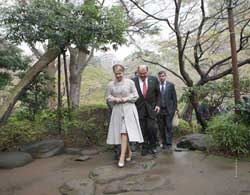Japan and Ukraine: new cultural models

March 28, 2009, was the last day of the three-day visit of Ukraine’s Prime Minister Yulia Tymoshenko to Japan. Although its main purpose was to attract investments of the “Asian tigers” to Ukraine, the schedule also included familiarization with Japan’s cultural traditions. The ancient traditional culture of the Land of Rising Sun is extremely interesting, just like its people, who are a part of this culture and have outstripped the entire world in terms of scientific and technical progress and longevity.
On the same day Kyiv hosted an international conference entitled “Ethnos in the Space of Intercultural Interaction. Ukrainian-Japanese Parallels,” which was attended by Japanese and Ukrainian scholars who study Japanese culture, the employees of Japan’s embassy in Ukraine, and others.
Halyna Bondarenko, a research fellow at the Maksym Rylsky Institute of Art Criticism, Folklore Studies, and Ethnology, shared her impression of the Japanese:
“Despite the fact that our countries are located far from each other, I believe that everyone has a certain image of Japan and the Japanese. Mine is as follows.
“Once I was ascending the Mount Sinai with a group of Japanese tourists: the temperature was 25 degrees above zero at the foot of the mountain and 5 degrees below zero where we were going. The stairs were covered with ice, the wind was blowing, it was hard to walk, and several times I even wanted to go back. But I saw two small Japanese women, who were crying, but held onto the handrail and kept on going. That is why I did not give up. This is how I imagine the Japanese people: they are those who scale peaks no matter what.”
Hanna Skrypnyk, the head of the Institute of Art Criticism, Folklore Studies, and Ethnology and the head of the International Association of Ukrainists, said that cultural exchange between the countries should become that bridge which will help overcome the cult of consumption attitudes in many countries.
“When the meaning of national culture is being replaced with spreading mass culture, we can come to a point where we will lack many things. Ethnic culture is an adaptive mechanism of people, the invaluable wealth, and it would be a sin to lose it,” she noted. “We consider the culture built in Japan as a model; the achievements of the traditional culture that is professed by many people in Japan are combined with the openness of this society to global cooperation and the achievements of the civilization era.”
Japanese scholars were more critical of the condition of present-day Japanese culture. Today they are very much disturbed by the spiritual condition of the Japanese. In the opinion of Iwai Xatiro, a researcher of contemporary Japanese culture, “the present-day Japanese youth very much dislikes such notions as ‘good deeds,’ ‘duty,’ and ‘human feelings.’” He believes that in his country the generation gap is widening and the Japanese community is becoming eroded. The Japanese scholars admit that due to the value of a successful career, which has been cultivated in Japan in recent decades, and because of the low birth rate and great longevity, the traditional Japanese family has changed—the vision of the roles of men and women has changed, because many women have become socially active. However, the newest research data point to a shift: the Japanese are again becoming attracted to the traditional family where the husband is the head and the wife often does not have a job.
“The indefiniteness of human relations is growing, and society becomes more eroded. In these circumstances, when the Japanese traditions conflicts with the demands of present-day society, a new cultural model is developing,” Prof. Iwai Xatiro noted.
At the same time, the Japanese are proud of their country, as before, and this was specially cultivated in schools after World War II. Prof. Noda Masaaki said that one of the textbooks for children contained a figure showing Japan’s possible development: a magnifying glass on the map of Japan, showing that the country’s natural resources are limited, a hand with a caption saying one should work diligently (improve technologies), and a container with money. So, the amount of person’s pride for their country was in a direct proportion to the amount of work they did for their Fatherland. The organizers called the conference “the first step toward cultural cooperation” on the hope that cultural cooperation will be followed by economical collaboration. Murai Sinti, second secretary of Japan’s embassy in Ukraine, said that restaurants of Japanese cuisine are opening in Kyiv but little information about Japan is available in Ukraine. This gap will be filled, to some extent, by the newly published special issue of the magazine Narodna tvorchist ta etnohrafia. Yaponska etnolohia (Folk Art and Ethnography. Japanese Ethnology) produced by the Institute of Art Criticism, Folklore Studies, and Ethnology.






